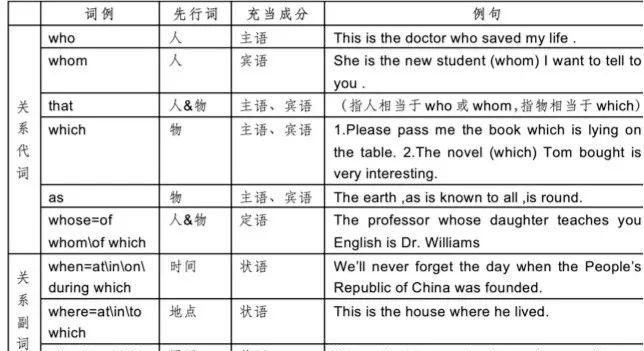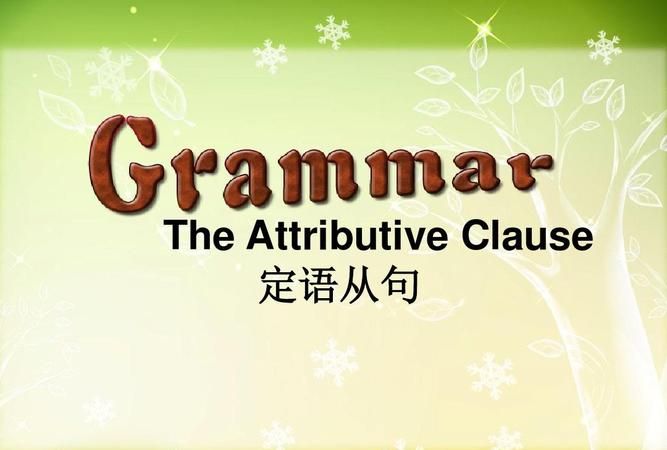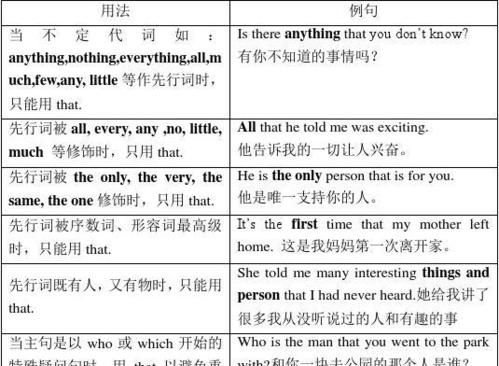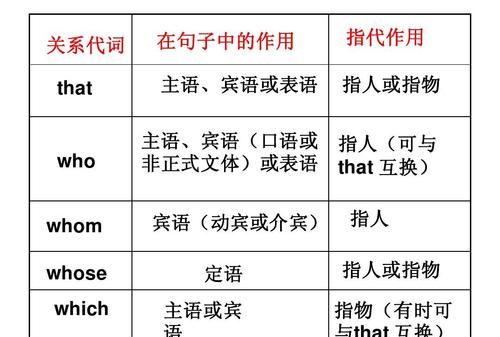本文目录
九年级上册英语定语从句例句
多的是
1.Tick
the
things
that
can
affect
your
feelings
and
moods.(从that到完是定语从句,修饰things)
2.I
have
some
exciting
news
to
tell
you.(to
tell
you
做定语,放在名词后)
3.Bring
your
information
tomorrow
and
we'll
decide
on
the
best
way
to
travel
on
our
field
trip.(to到完做定语)
4.I'd
love
to
go
by
plane.
5.Spring
is
the
best
time
to
climb
Mount
Tai.
6.There
are
many
interesting
places
to
visit.


含有定语的英语句子
关系代词引导的定语从句
关系代词所代替的先行词是人或物的名词或代词,并在句中充当主语、宾语、定语等成分。关系代词在定语从句中作主语时,从句谓语动词的人称和数要和先行词保持一致。
1)who, whom, that
这些词代替的先行词是人的名词或代词,在从句中作主语和宾语。例如:
Is he the man who/that wants to see you? 他就是你想见的人吗?(who/that在从句中作主语)
He is the man whom/ that I saw yesterday. 他就是我昨天见的那个人。(whom/that在从句中作宾语)
2) whose 用来指人或物,(只用作定语, 若指物,它还可以同of which互换)。例如:
They rushed over to help the man whose car had broken down. 那人车坏了,大家都跑过去帮忙。
Please pass me the book whose (of which) cover is green. 请递给我那本绿皮的书。
3)which, that所代替的先行词是事物的名词或代词,在从句中可作主语、宾语等。例如:
A prosperity which / that had never been seen before appears in the countryside.
农村出现了前所未有的繁荣。(which / that在句中作宾语)
The package (which / that)you are carrying is about to come unwrapped. 你拿的包快散了。(which / that在句中作宾语)
关系副词引导的定语从句
关系副词可代替的先行词是时间、地点或理由的名词,在从句中作状语。
1)关系副词when, where, why的含义相当于"介词+ which"结构,因此常常和"介词+ which"结构交替使用。例如:
There are occasions when (on which) one must yield. 任何人都有不得不屈服的时候。
Beijing is the place where(in which) I was born. 北京是我的出生地。
Is this the reason why (for which) he refused our offer? 这就是他拒绝我们帮助他的理由吗?
2)that代替关系副词,可以用于表示时间、地点、方式、理由的名词后取代when, where, why和"介词+ which"引导的定语从句,在口语中that常被省略。例如:
His father died the year (that / when / in which) he was born. 他父亲在他出生那年逝世了。
He is unlikely to find the place (that / where / in which) he lived forty years ago. 他不大可能找到他四十年前居住过的地方。
限制性和非限制性定语从句
1) 定语从句有限制性和非限制性两种。限制性定语从句是先行词不可缺少的部分,去掉它主句意思往往不明确;非限制性定语从句是先行词的附加说明,去掉了也不会影响主句的意思,它与主句之间通常用逗号分开。例如:
This is the house which we bought last month. 这是我们上个月买的那幢房子。(限制性)
The house, which we bought last month, is very nice.这幢房子很漂亮,是我们上个月买的。(非限制性)
2) 当先行词是专有名词或物主代词和指示代词所修饰时,其后的定语从句通常是非限制性的。例如:
Charles Smith, who was my former teacher, retired last year. 查理·史密斯去年退休了,他曾经是我的老师。
My house, which I bought last year, has got a lovely garden. 我去年买的的那幢房子带着个漂亮的花园。
This novel, which I have read three times, is very touching. 这本小说很动人,我已经读了三遍。
3) 非限制性定语从句还能将整个主句作为先行词, 对其进行修饰, 这时从句谓语动词要用第三人称单数。例如:
He seems not to have grasped what I meant, which greatly upsets me. 他似乎没抓住我的意思,这使我心烦。
Liquid water changes to vapor, which is called evaporation. 液态水变为蒸汽,这就叫做蒸发。
说明:关系代词that和关系副词why不能引导非限制性定语从句。

英语主语,宾语,谓语,定语,补语,状语每个八个例句翻译
一.主语
1.What he needs is a book.(句子做主语)
2.It is clear that the elephant is round and tall like tree.(划线部分是形式上的主语,主语从句是真正的主语)
3.He is against the suggestion that he keep silent at the meeting.(代词做主语)
4.Playing football not only makes us grow up but also makes us healthy.(动名词做主语)
5.I meet my best friend Tom at the station yesterday.(代词做主语)
6.Reading in the sun is bad for your eyes.( 动名词做主语)
7.One and half apples is left on the table. (名词做主语)
8.What he sent her were some pretty combs.( 宾语从句是真正的主语)
二.宾语
1.I like China.(名词作宾语)
2.He hates you.(代词最宾语)
3.We need two..(数词作宾语)
4.I enjoy working with you.(动名词作宾语)
5.I hope to see you again.(不定式作宾语)
6.Did you write down what he said?(宾语从句作宾语)
7.Are you afraid of the shake?(介词后的名词,介宾)
8.Under the snow,there are many rocks.(同上)
三.谓语
1.I saw the flag on the top of the hill.
2.He looked after two orphans.
3.He can speak English.
4.We do know English.(这里表示强调)
5.I need a history book.
6.She bought an album.
7.I met him on the street yesterday.
8.My mom gives me a gift on my birthday party.
四.定语
1.Yanling is a chemistry teacher.(名词)
2.We belong to the third world.(数词)
3.Give the lazy boy a lesson.(形容词)
4.The women with a baby in the arms.(介词)
5.The boys playing football are in Class 2.(现在分词)
6.The trees planted last year.(过去分词)
7.You should do everything that I do.(定语从句)
8.The woman in white ia an nurse.(介词)
五.补语
1.We elected him monitor.(名词)
2.We all think it a pity that she didn’t come back.(名词)
3. We will make them happy.(形容词)
4.We found nobody in.(副词)
5.Please make yourself at here(介词短语)
6.Don’t let him do that.(省to不定式)
7.His father advised him to teach the lazy boy a lesson.(带to不定式)
8.I’ll have my bike repaired.(过去分词)
六.状语
1.I will go there tomorrow.(时间)
2.I know him well. (修饰动词)
3.That meat went bad because of the hoe weather.(原因)
4.He goes to school by bike.(方式)
5.If you study hard,you will pass the exam.(条件)
6.He get up early in order to catch the early bus.(目的)
7.He plays the computer games every day so that he fails the exam.(结果)
8.I will meet you at the gift shop.(地点)

以上就是关于定语例句英语,九年级上册英语定语从句例句的全部内容,以及定语与英语 的相关内容,希望能够帮到您。
